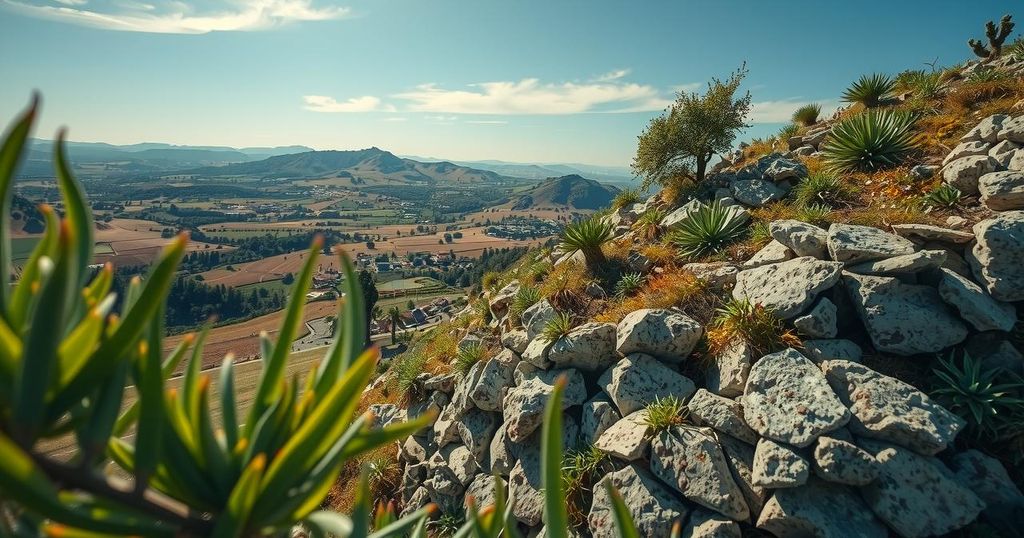Sardinia is emerging as a climate leader, promoting a model of local governance in energy production amidst pushback from the Italian government. President Alessandra Todde advocates for regional autonomy in managing renewable energy projects while protecting the island’s cultural heritage. Powerful local protests have highlighted community concerns over external corporate interests in energy development, pushing for greater decision-making authority and a sustainable future rooted in local identities.
Sardinia, Italy’s second-largest island, is taking a proactive stance in addressing climate change amidst growing concerns over energy production and environmental preservation. In the mountain town of Gavoi, solar panels dot municipal buildings, emphasizing the region’s commitment to sustainable energy. As climate advocates gather for COP29 in Azerbaijan, Sardinia’s President Alessandra Todde has pledged collective action against climate threats, especially following flooding incidents in nearby areas.
Sardinia’s journey towards climate leadership is unique, marked by its autonomous governance that allows it to diverge from Rome’s energy policies. Recent protests in Cagliari saw over 210,000 signatures supporting the “Pratobello 24” initiative, which seeks greater local control over renewable energy projects. President Todde firmly stated, “Sardinia, like it or not, will not accept to passively suffer decisions made from above,” reflecting escalating tensions between Sardinia and the Italian government over energy regulations and environmental impacts.
This emergent autonomy aligns with a broader movement across various nations advocating for local governance in climate action. Sardinia’s regional council suspended numerous wind turbine projects, criticizing previous administrations for prioritizing speculative energy ventures over local ecologies and communities. This decision led to a swift backlash from Prime Minister Giorgia Meloni, who launched a legal challenge against Sardinia’s jurisdiction.
Despite the pushback, the government approved legislation to define areas suitable for renewable energy, aiming to balance ecological preservation with energy development. Tensions continue as activists voice fears of cultural and environmental degradation. The rise of collective sentiment against outside energy interests echoes historical resistance to exploitation, fostering a cultural renaissance that intertwines Sardinia’s rich heritage with modern environmentalism.
Sardinians remain vigilant against potential threats to their cultural and environmental landscape from large-scale energy projects, which they argue disproportionately benefit outside corporations. The island is not merely a backdrop for industrial development; it is a living museum rich in archaeological significance. The local populace has rallied to protect these ancient sites, fearing that modern energy ventures could irreparably compromise their historical identity.
Simultaneously, local leaders and citizens are taking the initiative for sustainable practices, as seen in projects aimed at fostering eco-cultural arts. The island’s strategy for energy independence is becoming increasingly multifaceted and community-focused. Recognizing the importance of their cultural heritage, Sardinians are engaged in a dialogue about rights and responsibilities related to land use and energy production.
As Sardinia awaits legal proceedings to solidify its energy future, it embodies a pivotal message to both Italy and the global community regarding the need for localized climate action. The island stands at a crossroads, with local populations asserting their right to shape their environment and future, fostering an Eden-like vision of sustainable living underpinned by respect for history, community, and ecological integrity.
The article highlights Sardinia’s dedicated efforts toward climate action amid rising external pressures for energy production. Sardinia has legally positioned itself as an autonomous region, allowing it to push back against Italian government policies that prioritize speculative energy projects over local ecological and cultural needs. The island’s populace has expressed a growing demand for authority over its land usage, particularly in the face of substantial corporate interests seeking access to its renewable resources. This grassroots movement reflects a broader trend globally, wherein local communities demand greater involvement in climate-related decisions.
In conclusion, Sardinia illustrates a compelling case for local governance in climate action that prioritizes ecological stewardship and cultural preservation. The island’s push for autonomy over energy projects highlights the tensions between centralized policies and grassroots advocacy, asserting that the future of environmental sustainability should be determined by those most affected. As Sardinia navigates its path to becoming a climate leader, it stands as an example for other regions grappling with similar challenges, emphasizing the necessity of integrating community voices into the climate dialogue.
Original Source: www.salon.com






